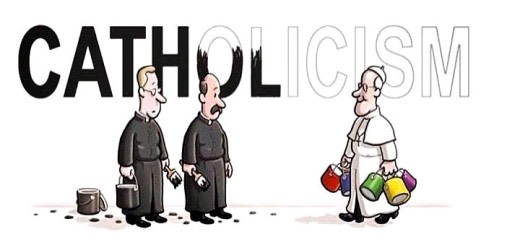The Catholic Church is bogged down: will Francis be able to move it?
Reflections by the theologian José Maria Castillo published on his blog Teología sin Censura (Spain) on 2 May 2016, freely translated by Dino
Doctor Elske Rasmussen a few days ago complained about those (cardinals, bishops, priests, friars...) who are committed to defending the concept that “the Pope is only authorized to repeat what the previous Magisterium has said, especially from Pius XII to Benedict XVI”.
That is, if I understand correctly, the “men of the Church” who resist Pope Francis are people who, perhaps without realizing what they are really doing, are actually defending a “Church bogged down”, not in the slime and mud of an impassable path, where it is not possible to advance and one goes nowhere, but a “Church bogged down” in something that is worse than a muddy path, that is, in a time and culture that no longer exist. Because this is, ultimately, the Church of Pius XII, that of John Paul II and that defended by Benedict XVI (as long as he was able).
The crux of the matter, in my opinion, lies in this: must the primary and determining concern of the Church consist in remaining focused on fidelity to the Magisterium and its truths or must it focus on the suffering of the people and their shortcomings? In the answer given to this question lies the key that explains the difference and distance that is perceived between the papacy of Benedict XVI and that of Francis. Without a doubt it is important in the Church to defend and maintain the Magisterium of our predecessors. But isn't it more urgent to remedy the suffering of the innocent?
It's not a question of agreeing with one pope and wronging another. The issue is more serious and more decisive. Ultimately, what we are experiencing in the Church, with the conflicts and frictions between the defenders of the previous papacy and the enthusiasts of Francis, is nothing other than the reproduction, on a small scale, of the clash between the "Masters of the Law" , defenders of their religious traditions, and the behavior of Jesus, who healed the sick, fed the poor and made friends with sinners and tax collectors. It is evident that Jesus in his time was not an exemplary man. But it is equally certain that the "exemplary" subjects (of then and today) soon remain abandoned in the trunk of memories while, as Professor Reyes Mate has well pointed out, the irrefutable statement of Theodor W. Adorno always remains standing : “Making suffering speak is the condition of all truth”. This leads me to conclude by asking myself a fundamental question: What truth can those defend who, when it suits them, leave suffering aside?
In this, it seems to me, lies the greatness, the novelty and the relevance of the Amoris laetitia, the new (and still unknown) vision of the family presented to us by Pope Francis.
Original text: The Iglesia atascada






